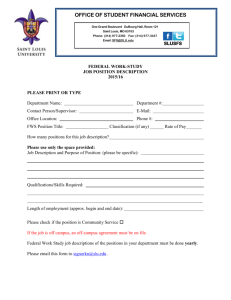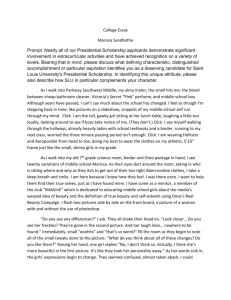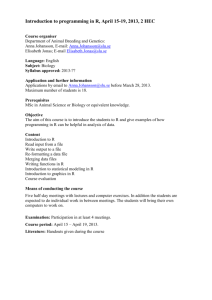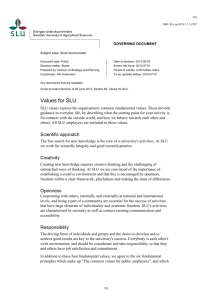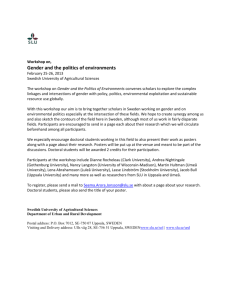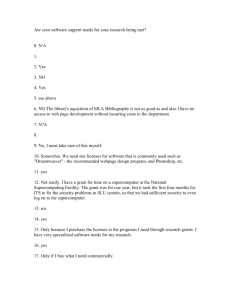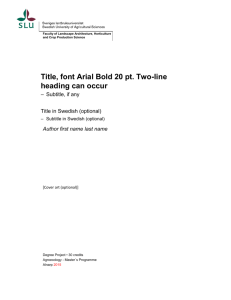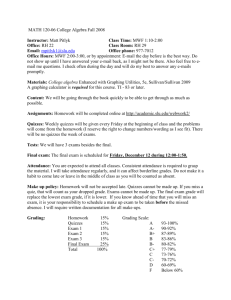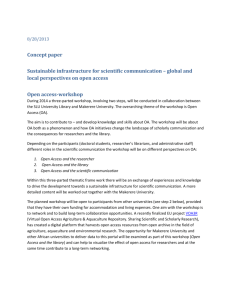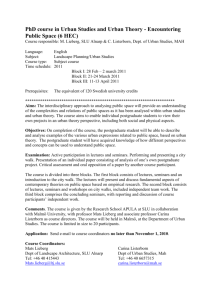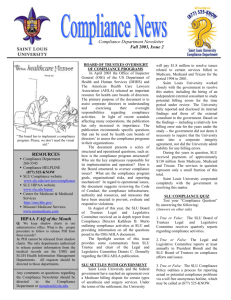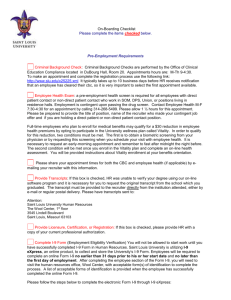STAT 110
advertisement
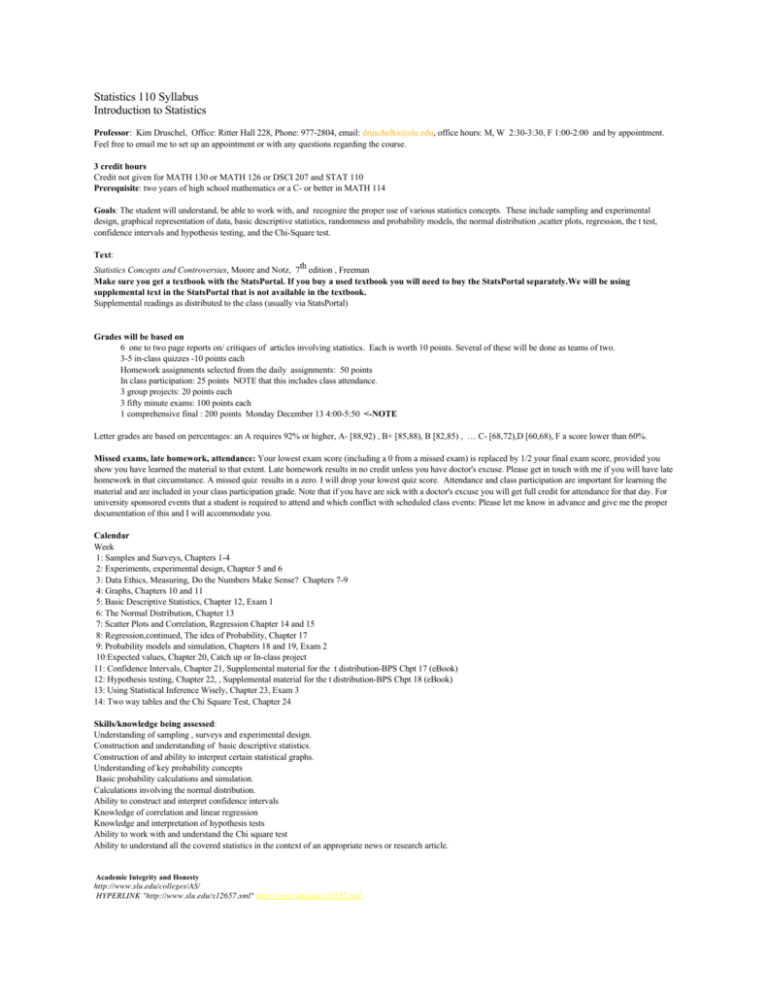
Statistics 110 Syllabus Introduction to Statistics Professor: Kim Druschel, Office: Ritter Hall 228, Phone: 977-2804, email: druschelks@slu.edu, office hours: M, W 2:30-3:30, F 1:00-2:00 and by appointment. Feel free to email me to set up an appointment or with any questions regarding the course. 3 credit hours Credit not given for MATH 130 or MATH 126 or DSCI 207 and STAT 110 Prerequisite: two years of high school mathematics or a C- or better in MATH 114 Goals: The student will understand, be able to work with, and recognize the proper use of various statistics concepts. These include sampling and experimental design, graphical representation of data, basic descriptive statistics, randomness and probability models, the normal distribution ,scatter plots, regression, the t test, confidence intervals and hypothesis testing, and the Chi-Square test. Text: Statistics Concepts and Controversies, Moore and Notz, 7th edition , Freeman Make sure you get a textbook with the StatsPortal. If you buy a used textbook you will need to buy the StatsPortal separately.We will be using supplemental text in the StatsPortal that is not available in the textbook. Supplemental readings as distributed to the class (usually via StatsPortal) Grades will be based on 6 one to two page reports on/ critiques of articles involving statistics. Each is worth 10 points. Several of these will be done as teams of two. 3-5 in-class quizzes -10 points each Homework assignments selected from the daily assignments: 50 points In class participation: 25 points NOTE that this includes class attendance. 3 group projects: 20 points each 3 fifty minute exams: 100 points each 1 comprehensive final : 200 points Monday December 13 4:00-5:50 <-NOTE Letter grades are based on percentages: an A requires 92% or higher, A- [88,92) , B+ [85,88), B [82,85) , … C- [68,72),D [60,68), F a score lower than 60%. Missed exams, late homework, attendance: Your lowest exam score (including a 0 from a missed exam) is replaced by 1/2 your final exam score, provided you show you have learned the material to that extent. Late homework results in no credit unless you have doctor's excuse. Please get in touch with me if you will have late homework in that circumstance. A missed quiz results in a zero. I will drop your lowest quiz score. Attendance and class participation are important for learning the material and are included in your class participation grade. Note that if you have are sick with a doctor's excuse you will get full credit for attendance for that day. For university sponsored events that a student is required to attend and which conflict with scheduled class events: Please let me know in advance and give me the proper documentation of this and I will accommodate you. Calendar Week 1: Samples and Surveys, Chapters 1-4 2: Experiments, experimental design, Chapter 5 and 6 3: Data Ethics, Measuring, Do the Numbers Make Sense? Chapters 7-9 4: Graphs, Chapters 10 and 11 5: Basic Descriptive Statistics, Chapter 12, Exam 1 6: The Normal Distribution, Chapter 13 7: Scatter Plots and Correlation, Regression Chapter 14 and 15 8: Regression,continued, The idea of Probability, Chapter 17 9: Probability models and simulation, Chapters 18 and 19, Exam 2 10:Expected values, Chapter 20, Catch up or In-class project 11: Confidence Intervals, Chapter 21, Supplemental material for the t distribution-BPS Chpt 17 (eBook) 12: Hypothesis testing, Chapter 22, , Supplemental material for the t distribution-BPS Chpt 18 (eBook) 13: Using Statistical Inference Wisely, Chapter 23, Exam 3 14: Two way tables and the Chi Square Test, Chapter 24 Skills/knowledge being assessed: Understanding of sampling , surveys and experimental design. Construction and understanding of basic descriptive statistics. Construction of and ability to interpret certain statistical graphs. Understanding of key probability concepts Basic probability calculations and simulation. Calculations involving the normal distribution. Ability to construct and interpret confidence intervals Knowledge of correlation and linear regression Knowledge and interpretation of hypothesis tests Ability to work with and understand the Chi square test Ability to understand all the covered statistics in the context of an appropriate news or research article. Academic Integrity and Honesty http://www.slu.edu/colleges/AS/ HYPERLINK "http://www.slu.edu/x12657.xml" http://www.slu.edu/x12657.xml The University is a community of learning, whose effectiveness requires an environment of mutual trust and integrity. Academic integrity is violated by any dishonesty such as soliciting, receiving, or providing any unauthorized assistance in the completion of work submitted toward academic credit. While not all forms of academic dishonesty can be listed here, examples include copying from another student, copying from a book or class notes during a closed book exam, submitting materials authored by or revised by another person as the student’s own work, copying a passage or text directly from a published source without appropriately citing or recognizing that source, taking a test or doing an assignment or other academic work for another student, securing or supplying in advance a copy of an examination without the knowledge or consent of the instructor, and colluding with another student or students to engage in academic dishonesty. Any clear violation of academic integrity will be met with appropriate sanctions. Possible sanctions for violation of academic integrity may include, but are not limited to, assignment of a failing grade in a course, disciplinary probation, suspension, and dismissal from the University. Students should review the College of Arts and Sciences policy on Academic Honesty, which can be accessed on-line at HYPERLINK "http://www.slu.edu/colleges/AS/" http://www.slu.edu/colleges/AS/ under “Quicklinks for Students” or in hard copy form in the Arts and Sciences Policy Binder in each departmental or College office. Students with Special Needs - Disability Services Any student who feels that he/she may need academic accommodations in order to meet the requirements of this course -- as outlined in the syllabus -- due to presence of a disability, should contact the Disability Services Office. Their web page is HYPERLINK "http:// www.slu.edu/x24491.xml" http://www.slu.edu/x24491.xml. Please telephone the office at 314-977-8885, email them at disability_services@slu.edu or their office is in the Student Success Center, Room 331 of the Busch Student Center. Confidentiality will be observed in all inquiries. Arts & Sciences Grading Scale The Arts & Sciences Grading Scale can be accessed at: HYPERLINK "http://www.slu.edu/x6352.xml" http://www.slu.edu/x6352.xml New undergraduate grading scale effective Fall 2005 Grade Points A 4.0 A- 3.7 B+ 3.3 B 3.0 B- 2.7 C+ 2.3 C 2.0 C- 1.7 D 1.0 F 0.0
